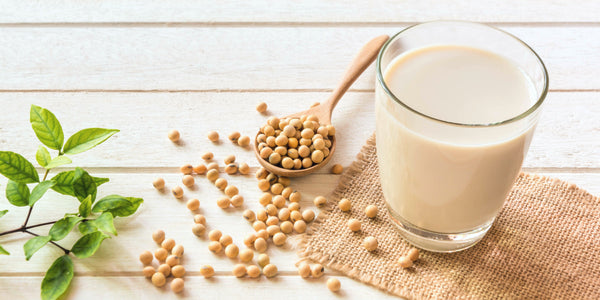
Soy has many nutritional benefits, but soy has also been linked to some potential negative health implications. Therefore, people often have positive and negative views on consuming soy and its implications for health.
However, soy is simply just a type of bean. It is commonly known as soybean in North America and soya bean in East Asia and other countries outside of the U.S.
The edible bean is cultivated and offers numerous uses and transformations, including soymilk, soy cheese, tofu, soy sauce, and veggie burgers, and hot dogs. Supplements may also include soy such as protein powder and capsules.
With soy one of the most debated nutrition topics, many wonder if they should be eating it. We outline the positive and negative effects of soy on health, if it is dietitian-approved, and if soy is bad for you.
Nutrients in Soy
In its whole, natural form, soy and soybeans (also recognized as edamame) are a cost-friendly, plant-based protein source. Soy is especially utilized in those following a vegetarian or vegan lifestyle. Not only is soy a high-quality protein source, but it is also a source of many vitamins, minerals, and fiber.
Protein in Soy
Soybeans are the only vegetable to provide a quality level of all essential amino acids. This is why it is a common protein source for vegetarians or vegans.
A cup of soymilk can provide about 7 grams of protein which is close to a cup of dairy milk which provides 8 grams of protein. In contrast, a cup of almond or rice milk only provides 1 to 2 grams of protein.
A soy-based veggie burger, a 3-ounce portion of tempeh (made from fermented soybeans), or a ½ cup of edamame can all provide between 11 to 14 grams of protein.
Minerals in Soy
Soy foods are a source of B vitamins, potassium, calcium, magnesium, and iron. The specific amounts of nutrients in soy products can vary depending on how the food is made and manufacturing practices.
Incorporating soy foods as part of a balanced diet may help reach the Recommended Dietary Allowance (RDA) for these minerals. Many Americans do not get adequate intake of potassium, calcium, iron, and magnesium.
In general, absorption of iron and calcium from plant foods can be lower compared to animal foods, but the absorption of calcium and iron from soy foods is good according to a 2016 Soy and Health Update.
Fiber in Soy
Getting enough fiber is important for digestive health, heart health, weight management, and regulating blood sugar levels. However, only five percent of Americans are reaching an adequate intake of daily fiber.
Women under age 50 years should aim to get 25 grams of fiber per day, and women over 50 years should aim to get 21 grams of fiber per day. Men under age 50 years should aim to get 38 grams of fiber per day, and men over age 50 years should aim to get 30 grams of fiber per day.
Increasing whole grains, fruits, vegetables, nuts and seeds, and legumes, like soy, can increase fiber intake. For example, a cup of edamame provides 8 grams of fiber, and an ounce serving of dry roasted soybeans provides 2 grams of fiber.
Health Benefits
Soy is a source of many important nutrients such as protein, fiber, minerals, and antioxidants. so it makes sense eating soy as part of a balanced diet may offer some health benefits.
While the health claims of soy may have changed over the years, the potential health benefit of soy remains.
Soy and Heart Health
One of soy's main health benefits got highlighted in the 1990s as soy being beneficial for heart health. This mainly was from a meta-analysis of 38 studies that concluded 50 grams of soy protein a day (equivalent to about 8 cups of soy milk) could significantly lower LDL cholesterol levels.
However, Harvard Health suggests more recent reviews of soy and heart health have found conflicting results with the 50 grams of soy protein and heart health. Soy still has a positive effect on heart health just in a different way than previously thought and probably in smaller portion sizes. The fiber and minerals in soy foods can have a positive effect on heart health.
The American Heart Association (AHA) suggests foods that are rich in a compound called isoflavones, like soy, could lower the risk of heart disease in young and post-menopausal women.
Cultures that have a high soy intake, like many Asian cultures, have a lower risk of heart disease compared to cultures that have a more traditional Western diet. However, this may be from other factors like physical activity levels or other diet differences between cultures.
Soy and Cancer Risk
Soy's impact on breast cancer risk may have the most controversy and confusion about if soy is bad for you. The American Cancer Society suggests so far there is no evidence that eating soy is dangerous or harmful for cancer risk.
In fact, there is even evidence to suggest eating whole soy foods, like tempeh, edamame, soy milk, tofu, or miso, may lower the risk of breast cancer in certain women.
Harvard Health suggests the results of a 7-year study from Shanghai with over 70,000 women showed women who ate the most soy (from real foods) had a lower risk of breast cancer compared to women with the lowest soy food intake.
Soy for Menopause
Soy is a popular interest to relieve symptoms of menopause without the side effects often caused by hormone therapy. This is because soy contains isoflavones, classified as phytoestrogens and estrogen receptor modulators, that may counteract the loss of estrogen even during perimenopause.
Research shows great benefit of soy for menopause, including reducing symptoms of hot flashes and vaginal dryness.
Fermented Soy Health Benefits
Soy products that are fermented can include certain types of tofu, natto (popular in Japanese culture), or miso. Fermented foods are made from "sitting" in a liquid base that is rich in strains of bacteria that can alter the food's taste, texture, nutrition, and provide a source of beneficial gut bacteria.
According to a 2020 British Medical Journal Editorial, research from Japan suggests a higher intake of fermented soy foods was associated with a significantly lowered risk of all-cause mortality. In other words, those who had a higher intake of fermented soy foods had a higher probability of living longer. This association was not seen with all soy foods, only fermented.
In fact, there is some evidence to suggest the fermented soy in miso may also act as protection against the high salt level found in miso. More research is needed to further this insight.
Potential Risks of Soy
If the American Cancer Society suggests soy foods are considered safe and healthy, why is there a controversy surrounding soy? Before a larger amount of human studies were done, some animal and in vitro studies suggested there may be harmful effects of soy and cancer risk.
The way animals process soy is different than humans, and this is one reason why the "soy and cancer controversy" has shifted away from soy being viewed as dangerous to not so dangerous as more human studies have happened.
Soy Supplements
What health experts still agree on with potential risks of soy is the use of supplements. Whether soy protein isolate, soy fiber, or isoflavones (taken from whole soy foods), always consult with a healthcare provider before taking a soy supplement.
There may be some potential risks with soy supplements related to cancer risk or other negative health outcomes. Eating whole soy foods as part of a balanced diet is considered safe, but taking soy supplements means you are getting very high amounts of just part of the soy plant which can impact the body differently.
Bottom Line: Is Soy Bad for You?
So, should you be eating soy? Research to date suggests there is no reason to avoid whole soy foods. Overall, many studies suggest eating soy foods can provide health benefits associated with the heart, potentially lower certain cancer risk, and decrease all-cause mortality.
As with any food and claim, though, no single one is a magic bullet or guarantees for a healthy, long life. Whole soy foods should be balanced with a variety of lean proteins, fruits, vegetables, whole grains, nuts and seeds, other types of legumes, and heart-healthy fats. If new to soy and products, experiment with them in a new recipe or as a replacement for other meats.
Also be wary of highly processed soy foods such as soy-based burgers as they can be marketed as "healthy" foods when they may contain little nutritional value or sneaky, questionable ingredients. Be cautious of soy supplements, too, as these may have potential risks not associated with whole soy foods.
Reference:
Messina M. Soy and Health Update: Evaluation of the Clinical and Epidemiologic Literature. Nutrients. 2016;8(12):754. doi:10.3390/nu8120754.







